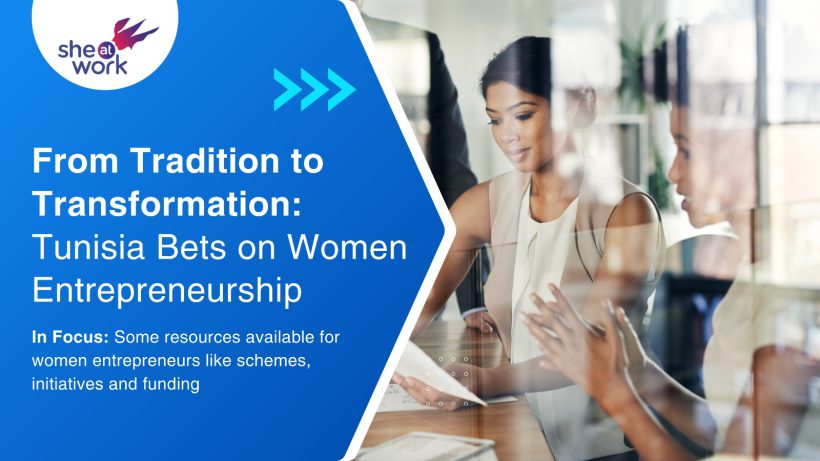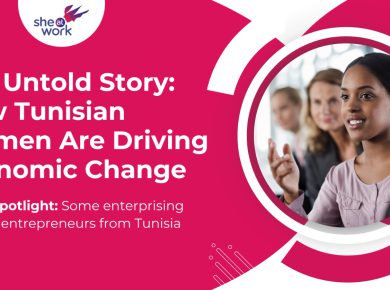In Focus: Some resources available for women entrepreneurs like schemes, initiatives and funding
#WomenEntrepreneurs #TunisiaBusiness #BreakingBarriers #SheLeads #NorthAfricaRising #EmpoweredWomen #SMEsInAction #InnovationByWomen
Often referred to by the nickname “The Land of Jasmine“, which highlights the country’s association with the jasmine flower, which is a symbol of beauty and is commonly found in the region.
And hailed as a beacon of democratic transition in the MENA region since its 2011 revolution, Tunisia is also emerging as a dynamic hub for women entrepreneurs. Despite systemic challenges, Tunisian women are making remarkable strides in shaping the country’s economic landscape. With women representing 60% of university students and graduating at higher rates than men, the country holds a strong foundation of female talent. Yet, women’s participation in the labour market remains low, underscoring a gap between educational achievement and economic engagement. Entrepreneurship, therefore, offers a promising pathway for women to channel their skills into meaningful ventures.
Resilient, Resourceful, Ready: Women Entrepreneurs Driving Tunisia’s Future
Today, Tunisia boasts one of the highest rates of women entrepreneurs in the MENA region, with 55% of women holding sole ownership of their firms. Women-led businesses also demonstrate significant impact, employing nearly 19 workers on average, making them vital contributors to job creation and social stability. However, Tunisian businesswomen continue to face obstacles – cultural resistance, family responsibilities, and limited access to networks and capital remain persistent barriers.
Women entrepreneurs in Tunisia are largely SME-focused, operating across diverse sectors such as – manufacturing, services, tourism, finance, health & technology. Increasingly, they are venturing into non-traditional fields like telecommunications, real estate, and finance, contributing to innovation and sectoral growth. While cultural norms, mobility restrictions & under-representation in STEM continue to limit their opportunities, the rise of support systems is creating new possibilities. Programmes like Women’s Enterprise for Sustainability (WES), networking platforms, and international partnerships are equipping women with training, financial resources, and market access.
To address these challenges, a wide array of resources is being mobilized. Government initiatives, such as RAÏDET, have supported over projects, and creating jobs too. The forthcoming National Strategy for the Promotion of Female Entrepreneurship in SMEs by 2035 – aims to further strengthen women’s role in business, supported by international partners like GIZ and BMZ. Coupled with Tunisia’s high internet penetration and growing digital tools, women entrepreneurs are increasingly finding opportunities to overcome constraints and build sustainable enterprises.
Now let us draw attention to some resources like initiatives, policies and funding that are available to women entrepreneurs in Tunisia.
- United Nations Industrial Development Organization (UNIDO)
This organization provides comprehensive support through initiatives like – the Promoting Women Empowerment (PWE) project, which offers capacity building, networking, and technical assistance. Recent projects include – the E-commerce Accelerator, which in 2023 trained 30 women entrepreneurs in e-commerce and e-marketing.
Italy and UNIDO partnered in June 2025 to transform Tunisia’s vocational training system in support of youth employment & sustainable development
Women Entrepreneurs of Tunisia is the first Tunisian portal dedicated to women entrepreneurs, offering a unique space for promotion, inspiration & collaboration.
The Italian Cooperation and the United Nations Industrial Development Organization (UNIDO) signed today a new funding agreement in Tunis for the launch of the project “Tunisie Professionnelle – Renforcer l’emploi en Tunisie par une formation professionnelle dynamique”.
With a total budget of €6.5 million, fully financed by the Government of Italy, the three-year project – aims to enhance youth employability in Tunisia through the modernization and revitalization of the national vocational training system. The initiative will be implemented in close collaboration with the MEFP.
The project focuses on – improving the quality, accessibility & market relevance of vocational training programmes, particularly for young people and women. It will support the modernization of training centers, introduce innovative teaching methods, and strengthen partnerships between public institutions and the private sector.
- International Labour Organization (ILO)
ILO supports rural women entrepreneurs through the AFERE programme, which partners with national institutions to develop entrepreneurship in rural areas. They also support initiatives like the Nakhwa Association for women and family, which helps local crafts become sustainable opportunities in Southern Tunisia.
From 26 to 28 May 2025, the Forum on the Social and Solidarity Economy (SSE) and Social Innovation took place in Tunis, which actually marked a milestone in Tunisia’s journey toward a more inclusive, equitable & sustainable economy. Co-organized by the Ministry of Economy and Planning, the Delegation of the European Union to Tunisia and the International Labour Organization (ILO), the Forum brought together stakeholders including representatives from the government, employers’ and workers’ organizations, SSE actors, international partners, researchers and youth leaders.
Building on a decade of ILO’s work in Tunisia on the SSE
The Forum drew on ten years of ILO’s work aimed at strengthening the SSE as a vehicle for decent work, youth and women empowerment and local economic development. The ILO began its work on the Social and Solidarity Economy (SSE) in Tunisia around May 2015, following a conference titled – “SSE as a driver of development and employment.” This event brought together the government and social partners under the auspices of the ILO and laid the groundwork for subsequent initiatives, including the development of Tunisia’s SSE law.
Milestones along this path included the adoption of the SSE Law in 2020 with the support of ILO under the PROMESS initiative; the strengthening of women-led SSE enterprises and their resilience in underserved regions during the COVID pandemic through FORTER’ESS; and the promotion of collective youth entrepreneurship and the creation of local SSE coordination platforms through PAJESS. Most recently the EU-funded JEUN’ESS project has further advanced this work by reinforcing integrated, youth-centred SSE ecosystems.
The Ministry of Finance of Tunisia has financially supported ILO in its activities against COVID-19.
- International Finance Corporation (IFC) & Startup Tunisia by Smart Capital
The Ebda’Y Tunisia Program organizes training sessions, hosts successful guest speakers, and provides grants of up to $10,000 to support women entrepreneurs.
The International Finance Corporation (IFC) supports private sector development in Tunisia – through investments and advisory services, focusing on sectors like clean energy, manufacturing, agribusiness, and financial services. Recent efforts include a large-scale solar project, the launch of an Integrated ESG Programme to promote sustainable practices & ongoing work to strengthen the country’s corporate governance and business environment. The IFC has been a partner in Tunisia for 60+ years, working to boost economic growth, job creation & financial inclusion.
To boost sustainable business growth and private sector investment in Tunisia, IFC launched a new programme promoting environmental, social, and governance (ESG) best practices in the country’s financial, manufacturing and agribusiness sectors.
In partnership with the Swiss State Secretariat for Economic Affairs (SECO), IFC’s Integrated ESG Programme will work with – financial institutions, real sector companies, and industry associations in Tunisia to advance adoption of ESG best practices and strengthen their performance.
The programme, which is ISC’s first focused on ESG in Tunisia, and will also support banking and financial market regulators, including the Central Bank of Tunisia (CBT) and the Tunis Stock Exchange (BVMT) – to improve their capacity to integrate, monitor and enforce ESG standards. Currently, there are limited ESG requirements in the banking sector, while ESG reporting is voluntary on the Stock Exchange.
If you look at it, good ESG practices help businesses and communities better manage risk and protect the environment. They also help companies boost their reputation, reduce costs & strengthen stakeholder relations
- STARTUP TUNISIA
Smart Capital, a management company approved by the CMF, is in charge of implementing STARTUP TUNISIA.
STARTUP TUNISIA is a national initiative – that aims to make Tunisia a country of startups at the crossroads of the Mediterranean, the MENA region and Africa.
- TunisianStartups
TunisianStartups is all about building a thriving startup ecosystem.
Founded in 2016, TunisianStartups is an NGO started by entrepreneurs for entrepreneurs to give voice to the entrepreneurial ecosystem and connect its actors. Their projects strengthen the entrepreneurial ecosystem and empower Tunisian startups.
Their vision is – to create an environment that accelerates the success of Tunisian startups on both a national and international scale.
And their mission is – to create a favourable and dynamic environment for startups creation. Federate and strengthen the ecosystem by reinforcing synergies between entrepreneurs. And also to offer international opportunities for entrepreneurs and startups.
https://www.tunisian-startups.com
- The Tunisian Startup Act
Most importantly, the Tunisian Startup Act aims to position Tunisia as an ‘innovative business hub’ – for startups at the crossroads of the mediterranean region, Europe and Africa. As a regulatory framework it is designed to support entrepreneurs – in creating, financing, organizing and internationalizing their businesses.
And, to this end, the Startup Act has developed several innovative features – including measures to encourage entrepreneurs such as startup grants or startup leave, financing instruments like a guarantee fund or support for internationalization through a foreign exchange account.
The legislative process for the Tunisian Startup Act is different most other laws. Instead of emanating from government representatives or members of parliament, the initiative behind the law stems from a bottom-up movement within the startup ecosystem. Members of the ecosystem pushed and accompanied the process from the initial brainstorming phase, through the design of the measures, the discussion and voting in the legislative bodies to the implementation of the law. The ongoing implementation of the Startup Act – which is the administrative-legal pillar of the national strategy “Startup Tunisia” – will be managed by the newly created company, “Smart Capital”, and closely followed by the representatives of the Tunisian startup ecosystem.
- Club des Femmes Entrepreneures de Tunisie
Besides offering mentorship programmes, this Club connects women entrepreneurs with opportunities within EU-funded projects such as Adapt, Greenov’i, CQE, Insadder, and Initiative Tunisie.
Created in 2015, by Managers magazine, the Tunisian Women Entrepreneurs Programme (FET) – is the first platform entirely dedicated to promoting and supporting women entrepreneurs throughout Tunisia to promote their access to the local & African market.
The Women Entrepreneurs of Tunisia (FET) programme is committed to promoting and supporting Tunisian women entrepreneurs, by recognizing their excellence and strengthening their competitiveness. This is achieved by facilitating their access to markets and encouraging a new generation of women leaders capable of driving the Tunisian economy forward.
Being the first Tunisian portal dedicated to women entrepreneurs Women Entrepreneurs of Tunisia offers a unique space for promotion, inspiration & collaboration. The Women Entrepreneurs of Tunisia programme propels women entrepreneurs toward excellence and growth – by celebrating innovation, promoting skills development, and opening doors to new markets through the Women Entrepreneurs of Tunisia trophy, networking events, mentoring training sessions, and export support programs.
- FET Awards
If you are wondering, what does this event do, it recognizes and celebrates women entrepreneurs – highlighting their contributions to Tunisia’s economic and social development.
“FET Awards” can refer to multiple distinct programmes or recognitions, including the FET Awards for Tunisian women entrepreneurs (honoring innovation and impact), the QQI/FET awards in Ireland (referring to the Further Education and Training Awards Council qualifications), and awards given to companies like Taiwan’s 遠傳電信 (FET) for achievements in innovation and sustainability.
Recently, in February 2025, the 10th edition of the Trophées de Femmes Entrepreneures de Tunisie (FET) honoured nine outstanding Tunisian women entrepreneurs – for their innovation, resilience & the impact of their ventures. Organized by Managers magazine in collaboration with the Delegation of the European Union and the Friedrich Naumann Foundation for Freedom, the event brought together a distinguished audience, including ministers.
- E-commerce for Women Entrepreneurs (ITC)
This initiative, from the International Trade Centre (ITC), helps women-led small & medium-sized enterprises (SMEs) expand their exports through e-commerce and virtual marketplaces.
The International Trade Centre (ITC) promotes e-commerce for women entrepreneurs through its SheTrades Initiative – offering virtual capacity building via the shetrades.com platform, access to tools and a supportive community, and targeted grants to help them scale their businesses, access global markets, and boost their digital skills.
The overall purpose of the project is – to increase exports of women-led SMEs from Tunisia through Virtual Market Places as a new effective channel to expand export markets and benefit from new business opportunities. The ultimate objective is – to create new jobs, particularly for women, and to ensure more inclusive and sustainable social and economic development.
In fact, the project will train and create a core group of 20 e-commerce advisors (majority women) that will provide coaching and advisory services to 130 women-led SMEs so that they use the VMPs as an effective way to promote and sell their products and services.
https://www.intracen.org/our-work/projects/tunisia-e-commerce-for-women-entrepreneurs
- Microfinance & Micro-credit Programmes
Several programmes focus on microfinance – providing small loans to women entrepreneurs in the service sector. These have shown a positive impact on entrepreneurship development.
The purpose of microfinance institutions such as “Enda Tamweel” is to help people who are struggling to access the traditional financial system. This includes those living in rural or disadvantaged areas where the informal economy is prevalent, accounting for 34% of Tunisia’s GDP. However, microfinance institutions need resources to be able to serve an increasingly large and diverse customer base.
Enda Tamweel serves a specific mission to economically empower marginalized households, and particularly women and youth – by providing a full range of high-quality financial services and fostering micro-entrepreneurship.
Loans adapted to the needs of the market
The purpose of microfinance institutions such as Enda Tamweel is to help people who are struggling to access the traditional financial system. This includes those living in rural or disadvantaged areas where the informal economy is prevalent, accounting for 34% of Tunisia’s GDP. However, microfinance institutions need resources to be able to serve an increasingly large and diverse customer base.
The European Investment Bank (EIB) supports these institutions as they grow and develop. It helps them contribute to social progress through micro-entrepreneurship & promote financial inclusion, in particular among the most vulnerable customers such as young people, women and individuals living in disadvantaged rural areas.
https://www.sidi.fr/en/partners/partenaires/enda-tamweel
- Women Entrepreneurs Finance Initiative (We-Fi)
An international partnership that supports women entrepreneurs in developing countries. Housed in the World Bank Group.
We-Fi is a collaborative partnership among 14 governments, eight multilateral development banks (MDBs), and other public and private sector stakeholders, hosted by the World Bank Group. We seek to address financial and non-financial constraints faced by women-owned/led small and medium enterprises in developing countries.
For example, We-Fi and IFC investments have enabled Flat6Labs Tunisia to strengthen its gender-focused strategy and create more opportunities for women entrepreneurs. The project aims to specifically address two core problems:
first, the low number of women-led companies accessing the first stages of financing,
and second, the low graduation rates of women-led companies from one stage to the next (from acceleration to seed to venture to growth).
IFC and We-Fi’s support is expected to expand the circle of female mentors notably and drive up the number of female-founder applications.
https://www.linkedin.com/company/women-entrepreneurs-finance-initiative
https://we-fi.org/project/investing-in-women-led-startups-in-tunisia










